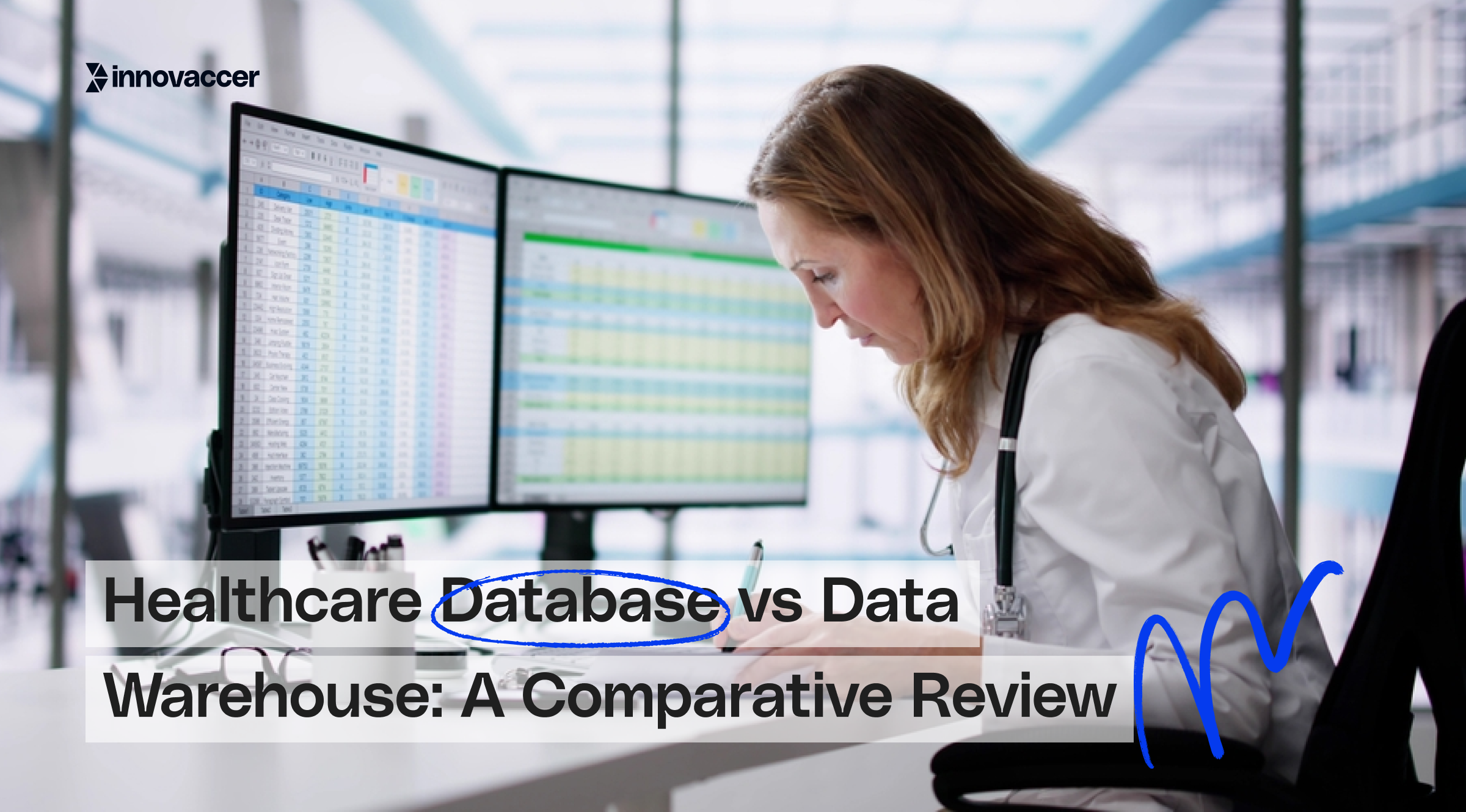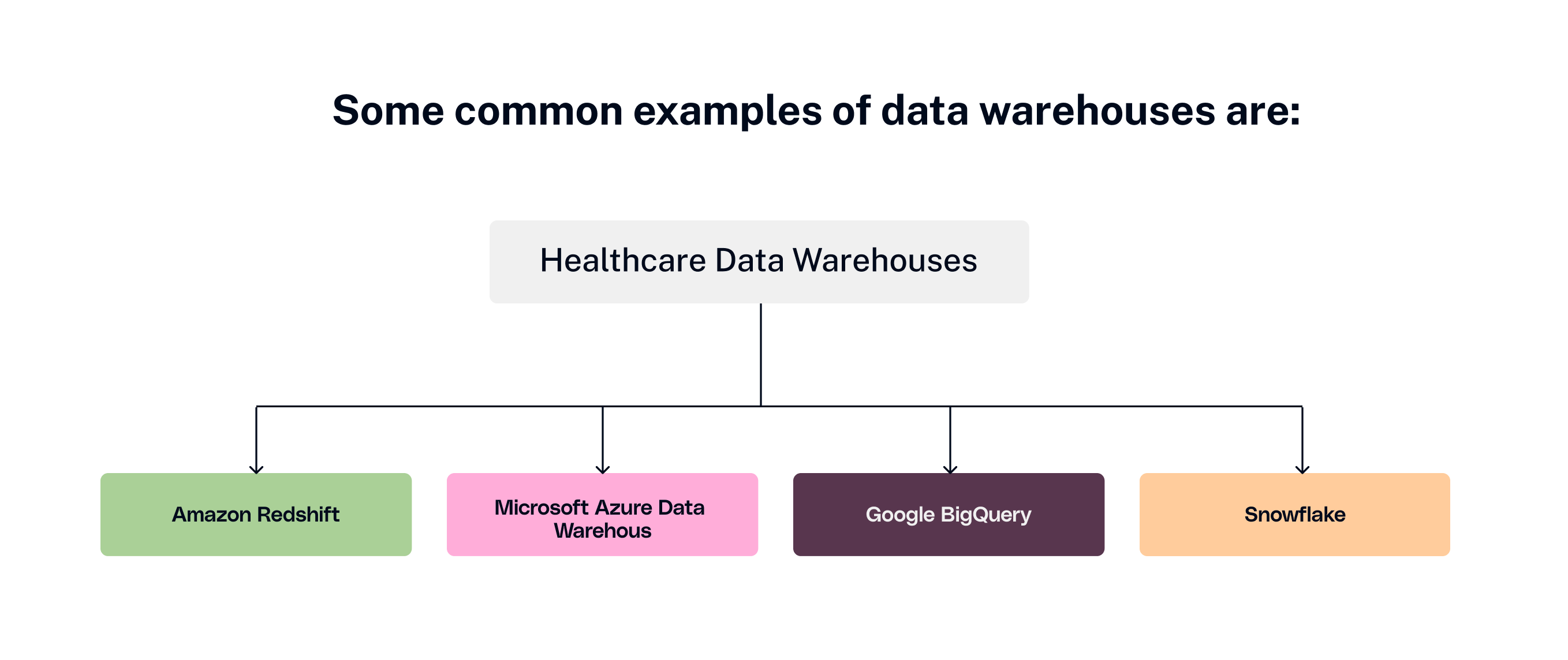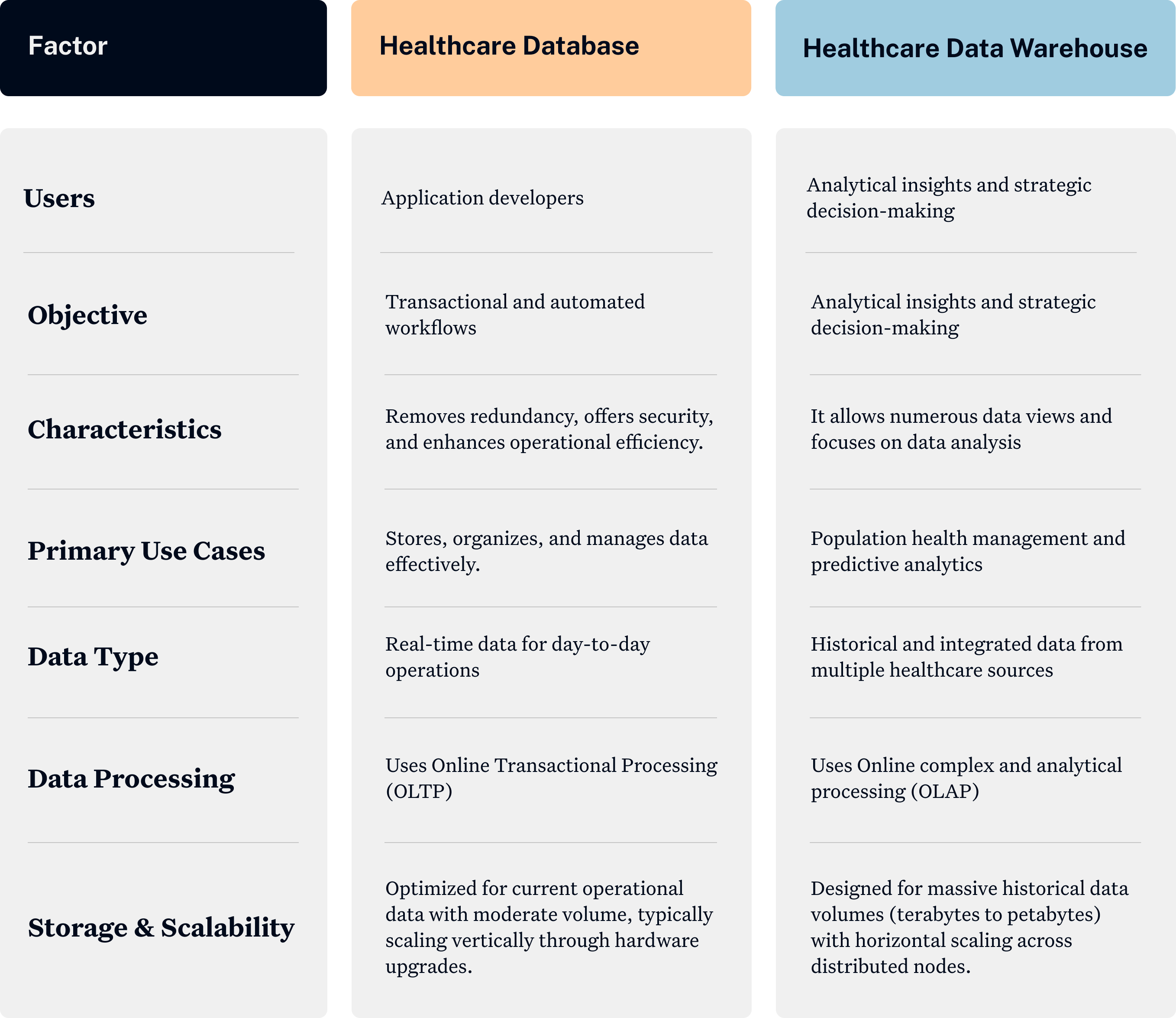Healthcare Database vs Data Warehouse: A Comparative Review

If you’re working in healthcare, chances are you must have heard of terms like “database” and “data warehouse”. Though both appear to be doing the same thing- storing data, they are fundamentally different.
Most organizations are already using some form of database to manage their daily operations such as storing patient information and processing prescriptions. But with the growing volume of data and demand for valuable insights, it is common to wonder: Is a database sufficient or do we also require a data warehouse?
While databases are designed for daily transactions, data warehouses enable long-term analysis. Let's compare a healthcare database vs a data warehouse and discuss why you need both to make better healthcare choices.
What is a Healthcare Data Warehouse?
A healthcare data warehouse is a centralized data hub that collects, stores, and processes information from several healthcare sources, ranging from EHRs to wearable devices.
It allows you to analyze large volumes of historical and real-time data for long-term decision-making. This is different from a conventional database which is concerned with day-to-day transactions. A data warehouse transforms raw data and organizes it well so that it is simpler to handle various types of data sets, track trends, and anticipate patients' needs, hence resulting in improved health outcomes.
The data integrated by a warehouse is analyzed and segmented depending on the needs of your organization.

What is a Healthcare Database?
A healthcare database is designed to manage and store day-to-day information for clinical and administrative operations. It provides real-time patient data, improves workflows, and maintains the accuracy of patient records and transactions.
Types of healthcare databases are:
- Electronic Health Record (EHR) Systems: Records historical patient data
- Billing Databases: Handle insurance claims and payment processes
- Scheduling Platforms: Schedule patient appointments and synchronize provider calendars
- Pharmacy Management Systems: Monitor prescriptions and ensure patients receive the right medicines at the right time.
Though healthcare databases confer several advantages, organizations are increasingly turning to healthcare analytics platforms and data warehouses for strategic decision-making.
Key Differences Between Healthcare Databases and Data Warehouses
Now that we have a key understanding of data warehouses and databases, it's important to know how they are different from each other. Here’s a comparison of healthcare database vs data warehouse:

Choosing the Right Healthcare Data System: Database vs. Data Warehouse
Whether you should opt for a data warehouse or a database will be influenced by the goals of your organization.
When to Use Databases in Healthcare?
Healthcare databases are an integral aspect of hospitals and clinics in their daily operations. They are built for speed and precision so that healthcare providers can access pertinent patient information in real-time. They are essential working tools for both front-line staff and administrative staff to help facilitate patient interaction and streamline administrative functions. A database is the ideal choice for your organization if the main emphasis is on:
- Handling patient records and clinical workflows for efficient care delivery.
- Processing real-time transactions such as insurance claims and appointment scheduling.
- Providing high-speed accessibility for healthcare professionals who need instant and up-to-date patient information.
While databases are indispensable for operational efficiency, they are not built for large-scale analytics or long-term healthcare data integration.
When to Use Data Warehouses in Healthcare?
Data warehouses provide the necessary analytical foundation for organizations looking to scale their population health management and quality improvement initiatives. Through healthcare data aggregation, a warehouse creates a unified and reliable source of truth.
You should opt for a data warehouse if you have the following goals:
- Managing population health by identifying high-risk patients early and delivering targeted interventions
- Forecasting finances by understanding cost trends and making data-driven decisions
- Ensuring data security and data privacy across all systems.
- Modeling predictions by using AI and machine learning to predict patient needs and deliver data-driven insights.
Challenges in Implementing Healthcare Data Systems
The adoption of health databases and data warehouses can be challenging due to the following:
- Ensuring data security and compliance with regulations like HIPAA (Health Insurance Portability and Accountability Act) and GDPR (General Data Protection Regulation)
- Moving old patient data from legacy health systems can disrupt daily operations and lead to errors. Additionally, integrating these legacy data with existing workflows can require custom development or middleware solutions.
- It may be hard to justify the initial expense of new technologies such as databases or data warehouses when budgets are limited.
Best Practices for Healthcare Organizations
To get the most out of healthcare data systems, organizations should employ a holistic approach that integrates the speed of databases with the analytical capabilities of data warehouses:
- Implement strong data quality management with regular audits and standardized data harmonization methods to ensure information is consistent across all systems.
- Develop a robust security and privacy framework for protecting sensitive patient data
- Choose technology partners carefully with proven experience in healthcare, advanced healthcare analytics platforms, and interoperability capabilities that are well-suited for your organization.
- Create an implementation roadmap with defined milestones, training plans, and performance metrics to drive smooth adoption and lasting results.
These are some of the best practices that will not only help you in mitigating risks but also enable you to unlock the full potential of data-driven healthcare.
Final Thoughts
To conclude, in today’s healthcare landscape, we need to leverage both data warehouses and databases effectively. While data warehouses offer the insight required for effective decision-making, databases ensure smooth day-to-day operations. Both are essential to drive population health management and ensure cost savings.
By utilizing the appropriate data tool for your organization's requirements, you can enhance patient outcomes and remain at the forefront of this data-driven era.





